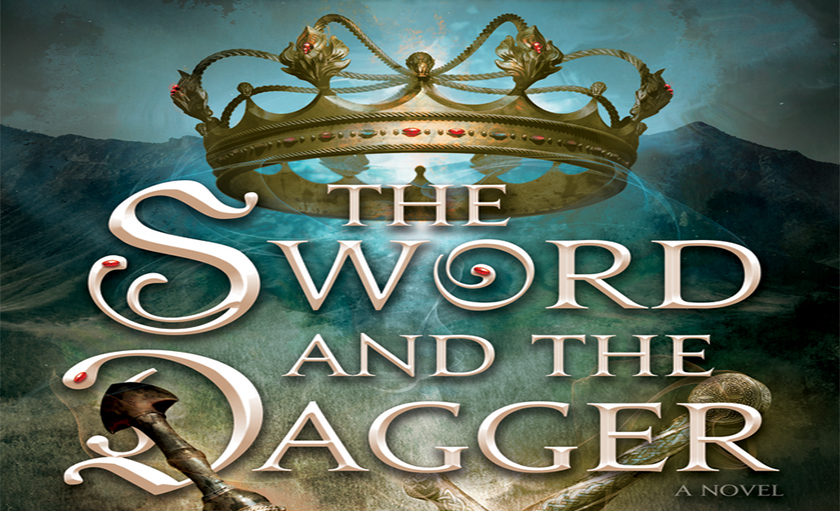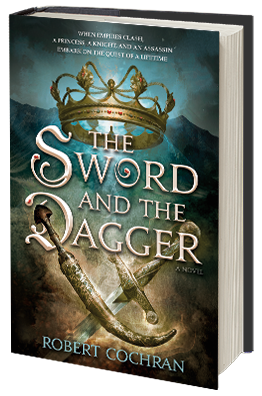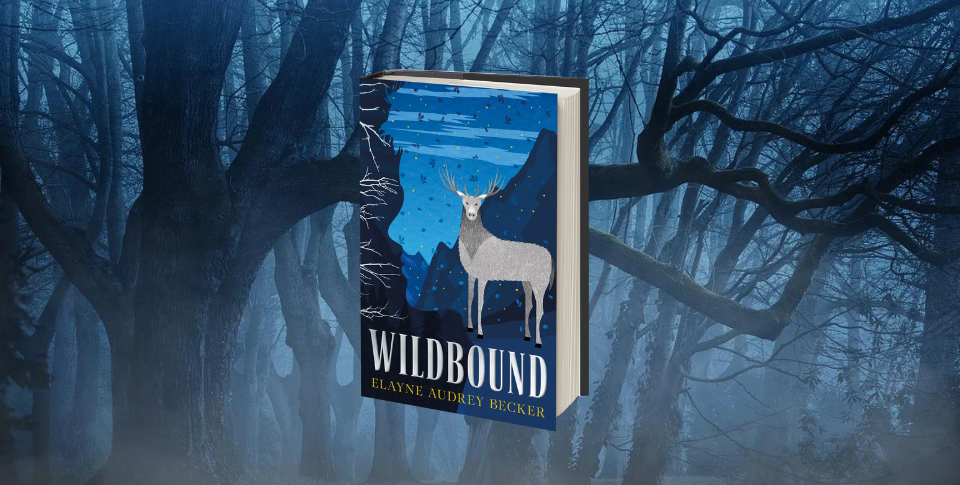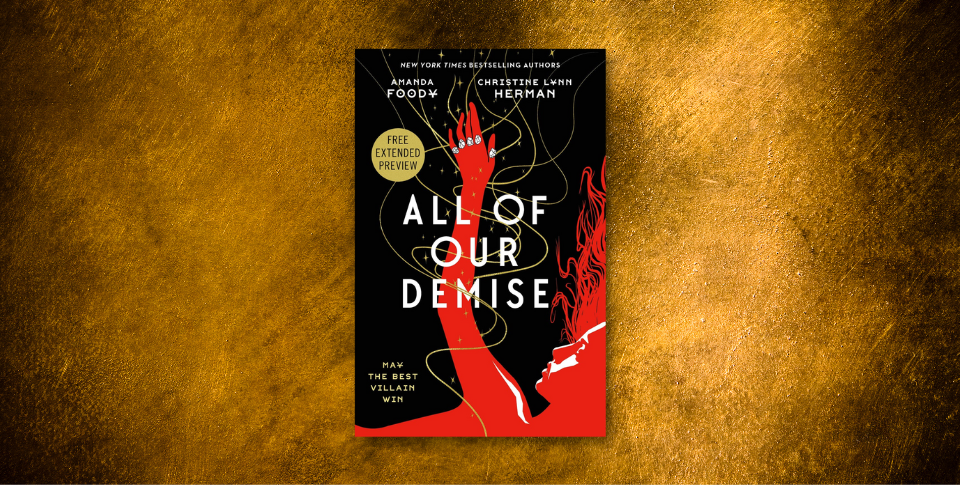
The Sword and the Dagger is an epic YA historical adventure by debut novelist Robert Cochran, the Emmy Award-winning executive producer and co-creator of the hit TV series 24.
During the time of the Crusades, an unlikely trio a princess, her affianced prince, and an assassin embarks on a quest to the court of the most fearsome warrior the world has ever known, Genghis Khan.
A rousing tale of adventure and romance about three young people who must grapple with fundamental issues of loyalty, friendship, faith, honor, and courage against the backdrop of conflicts that still resonate today.
1
 [dropcap type=”circle”]W[/dropcap]hat kind of an ass sends a lock of his own hair as a gift?” said Princess Elaine.
[dropcap type=”circle”]W[/dropcap]hat kind of an ass sends a lock of his own hair as a gift?” said Princess Elaine.
It was not a rhetorical question, though Bernard, Regent of Tripoli, seemed to think it was as he and Elaine strolled through the royal garden of the castle. Bernard pretended to be distracted by the lovely flowers that lined the path, sparkling with the dew of a bright spring morning. Dozens of species were present but only two hues—blue and white, the heraldic colors of the Kingdom of Tripoli. But Elaine wasn’t to be put off. “Bernard?”
“You shouldn’t speak that way of your betrothed,” he said finally.
“But doesn’t it seem vain?”
“I’m sure he meant well,” Bernard said.
Elaine looked at him for a long moment and Bernard couldn’t prevent the corners of his mouth from twitching upward in a reluctant smile. “It’s a little vain, perhaps,” he conceded. “But well intended.” He smoothed his thin mustache with his thumb and forefinger, wiping the smile from his face. “The garden is looking quite beautiful, don’t you think?”
Elaine nodded absently. The garden was indeed beautiful, and bustling with activity. Pageboys and maids were hanging lanterns and pennants from fruit trees, while gardeners clipped and trimmed juniper bushes into dragons, unicorns, and other fantastic shapes that defied description. Servants pushed barrows piled high with freshly picked vegetables headed for the kitchen and filling the air with the mingled scents of radishes, leeks, and garlic. Whenever anyone caught sight of Elaine they gave her a wide smile, usually accompanied by an annoying twinkle in their eyes, as if they knew how happy she must be. She smiled back, trying to seem genuine. Meanwhile, she pressed on: “As I remember, Conrad always was a little vain.”
“That’s not fair,” said Bernard. “You haven’t seen him for six years. He was just a boy! Suppose he judged you as a prospective bride based on his memories of you as a ten-year-old!”
“I suppose I should give him the benefit of the doubt, at least until I see him again.”
“Oh, Bernard!” A high-pitched voice sounded from behind them. Bernard turned, thankful for the interruption. It was his wife, Margaret, always high-strung and now particularly anxious, her thin fingers waving nervously like leaves in the light breeze. “I’m worried about the sweetmeats. I mean, will there be enough?”
“Surely the cook has seen to that,” Bernard said patiently.
“Well, I don’t know,” said Margaret vaguely. “I just . . . I just . . .”
“Would you like me to look into it?”
“Yes, if you don’t mind.”
“Of course.”
Margaret nodded her appreciation, then turned to Elaine.
“I’m so happy for you! This will be the most magnificent wedding since . . . since . . .”
“Thank you, Margaret,” Elaine said. “And thank you for all the trouble you’ve gone to.”
“Trouble? What trouble? You’re the Princess, after all!”
Elaine watched as Margaret fluttered away. She didn’t exactly dislike Margaret, but it was impossible to relax when she was around. And though Margaret had tried to be a mother figure to Elaine, she’d never been able to hide the fact that she found the task rather burdensome. Margaret’s happiness over the wedding was no doubt sincere, for it meant that Elaine would soon be out of her hair.
Elaine looked down at the locket she held in her hand. It was made of silver and its design was simple and elegant, with a small clasp that opened easily. If it had contained something besides tangled strands of Prince Conrad’s light brown hair, she would have admired it. She had an impulse to turn the locket over and let the hair fall to the ground, but that was impossible, certainly with Bernard watching; she was obliged to keep the gift intact and even appear grateful for it. She closed the locket and dropped it into the wide pocket of her dress.
“The locket is very beautiful,” Bernard said. “At least your young man has taste.”
“Assuming he picked it out himself.”
From a nearby aisle came a peal of girlish laughter. Elaine glanced over to see several of her maids-in-waiting gathered around a large bush, which they were busily trimming. Their leader, Matilda, daughter of Lord Basil, one of the castle’s nobles, saw Elaine watching and said something to the other girls, who stepped aside, giggling, revealing that the bush was now in the shape of a very large rooster. The rooster was a common fertility symbol and it was rather shocking that a group of young maidens would create it at least they hoped it would be shocking. Elaine widened her eyes and threw up her hands in an exaggerated expression of horror that made the girls laugh, and they sent her on her way with cries of “Good luck!” and “May your marriage be a fruitful one!” and, of course, with big smiles and twinkling eyes. It occurred to Elaine that everyone in the castle was excited about the wedding except the bride. But she couldn’t seem to help herself.
Then again, not quite everyone was excited. The castle’s Constable, a tall, gaunt, stern-faced man named William Delancey, approached and spoke stiffly to Bernard. “My lord Regent, I’m told the Prince is about two hours away.”
“All right. Everything seems ready,” said Bernard.
“Evidently he’s bringing quite a large retinue.”
“Well, make sure we can accommodate them all.”
“As you wish.” Delancey gave Elaine a respectful but brief nod, then walked away. That he didn’t smile was almost a relief, though it reminded Elaine that he disapproved of the coming marriage, claiming that he didn’t trust Antioch to be a loyal ally. Of course, a constable was in charge of the castle defenses, and perhaps suspicion went along with the job. But these thoughts were quickly replaced by dismay at the thought of Conrad arriving in the next two hours.
As if reading her mind, Bernard said: “From all I hear, Conrad is a fine young man. Now, he may not quite be the man his brother was, not yet anyway. But of course Charles was extraordinary. When he died the burden fell on Conrad and he was too young to bear it. But I’m told the years in France have done him much good and there’s every hope that he’ll become another Charles. Something like him, anyway.”
He doesn’t even believe it himself, thought Elaine. Out loud she said, “It is possible for a woman to rule alone, you know.” She’d had this conversation with Bernard before. It led nowhere but she felt she had nothing to lose.
“You’ve been reading your father’s books again,” Bernard said.
“Penthesilea, for example, Queen of the Amazons. And Boudica, who fought the Romans.”
“Don’t forget Cleopatra,” Bernard said.
“And Eleanor of Aquitaine! She went on a Crusade, wore men’s armor, ruled in her own name, married two kings, and gave birth to two more. Now that was a woman who lived!”
“I met her once,” Bernard said suddenly.
Elaine couldn’t have been more surprised if he’d sprouted antlers. “You met Eleanor of Aquitaine?”
“Indeed I did.”
“Well, what was she like? Tell me!”
“It was many years ago, on a visit to France. I was quite young, I don’t remember much. She was old when I saw her, and quite thin, as I recall.”
“Was she still beautiful?”
Bernard wrinkled his nose. “Not really.”
“But she was wearing armor . . .” Elaine said hopefully.
“No, strangely enough she was wearing a dress, like a normal woman.”
“But she wasn’t a normal woman,” Elaine insisted. “She’d seen the world!”
“It didn’t do her much good, from what I could tell. She seemed rather sad.”
“I don’t believe she was sad, not after all she’d done and the places she’d been.”
Bernard shrugged, not willing to argue the point.
“Sometimes I think her soul has been reincarnated in me,” said Elaine.
Bernard stared at her blankly.
“That’s when someone dies, and their soul comes back in another body. I think Eleanor’s soul may be in mine.”
“Where on earth did you get an outlandish idea like that?”
“I read it in a book, about all the different ”
“I should have known!” Bernard interrupted. “That was probably Eleanor’s problem she read too many books and they put crazy ideas in her head. In any event, this reincarnation business is blasphemy. Don’t let the priests hear you talk such nonsense, and for God’s sake, don’t say anything like that to Conrad!”
This outburst silenced Elaine. After a moment, Bernard went on in a softer tone. “Elaine, I know you’re a little nervous. It’s only natural before a wedding, and, well, you probably feel a little bit alone. You never knew your mother, and I know you still miss your father we all do but I must say you spend too much time read- ing the books he left you. Some people thought I should have taken them away, but I felt they provided some consolation, yet they seem to have filled your head with . . .” He hesitated.
“Nonsense?”
“Let us say, with ideas that are not practical. And now the time has come when you must be practical. You must remind yourself that what you’re doing is important.”
“Yes, of course. Antioch and Tripoli must be united. I understand.”
“I know you understand with your head. But do you understand with your heart?”
“I’m not sure what you mean.”
“I mean you must find a way to give yourself to this marriage completely. It must last, it must produce children, it must be seen to be strong. Antioch and Tripoli are two islands surrounded by a vast sea of enemies. This wedding, this marriage, is not just about unity. It’s about survival. Not only your survival, but that of everyone and everything you see around you. Our whole way of life! It’s your duty as Princess and I tell you plainly, as I’ve told you before, it’s what your father would have wanted.”
Elaine fell silent again; there was no answer to this. Bernard went on. “Now the Prince will be here soon and you look like you’re going to a funeral. Can you not manage a smile?”
In fact, she couldn’t; but she tried, and the effort contorted her face and made Bernard smile and that finally brought a smile to her face as well, though a shaky one.
“Much better,” said Bernard. “I have preparations to attend to so I’ll leave you to gather your thoughts. But please be sure you’re ready when Conrad arrives, all right?”
She nodded and Bernard walked briskly away. Elaine watched him for a moment, then her eyes fell on a nearby vegetable patch, where gardeners were gathering onions for the coming feast. Onions. No doubt they accounted for the sudden appearance of tears in her eyes.
Elaine continued along the path, rather aimlessly. Tripoli’s royal garden had been designed to provide a glimpse of salvation, its paths laid out in the shape of interlocking crosses. Between the paths were groves of fruit trees, mainly apple and orange, which, after the long winter, were just coming into bloom even though the month of May was nearly over. An occasional cypress could also be seen, and here and there an acacia, with bright yellow blossoms that usually gave Elaine great pleasure.
No doubt Bernard was right in saying that her father, King Edmond, would have favored the marriage, and the reasons were plain enough. Three generations ago the Christians had stormed out of Europe and conquered the Holy Land. They’d taken much territory from the Saracens (as they sometimes called Muslims) and established four Crusader states: Jerusalem, Tripoli, Edessa, and Antioch. For a century they’d prospered, but eventually the Saracens had regrouped and retaken Jerusalem and Edessa. Now Tripoli and Antioch were all that remained, controlling their reduced dominions by means of a few strong castles like the one Elaine was in now. The marriage of Conrad and Elaine was intended to unite the last two Crusader states and halt further Saracen advances. All this Elaine knew, and she also knew that the marriage was inevitable.
She resumed her walk, which hadn’t been so aimless after all, for she found herself in a familiar place a narrow clearing that served as an archery range. Her spirits lifted. Archery had never appealed to her, but the range could be used for another purpose as well. She reached into the pocket of her dress she had insisted that her dresses have pockets over the scandalized objections of Margaret (“so unladylike!”) and took out a length of flaxen string some five feet long; at one end of the string was a loop, at the other a small knot, and in the center a curved patch of leather. A simple device and one of the oldest and deadliest weapons known to mankind: the sling.
Its use had become unfashionable in recent times, but a veteran knight, Sir Raymond, still had the skill and he had passed it on to Elaine. The sling was easy to make but difficult to use, so practice counted for more than strength; and, unlike a sword or lance or even a bow, it could be wielded as effectively by a woman as by a man, and it was Raymond’s firm belief unusual for a knight that a woman should be able to protect herself if necessary.
It had been a while since she’d practiced the wedding preparations kept getting in the way but she felt confident nonetheless. She searched the ground until she found a stone the size of a robin’s egg, and placed it in the leather patch. Then she put the loop of the string around the ring finger of her right hand, and held the knot between her thumb and forefinger of the same hand, letting the leather patch and the stone it contained dangle just above the ground.
For a target, she chose an orange tree fifty paces away or rather, an orange on the end of one of its branches. She stood at an angle to the tree, her left foot slightly forward.
She took a breath, recalled Raymond’s advice (“Speed means nothing if you miss. Take your time!”), then stepped toward the tree and swung the sling over her head twice. Then she whipped her hand forward in a throwing motion, letting the sling act as an extension of her arm. At the top of the arc she released the knot, and the stone flew, fast as any arrow, straight toward the target.
The orange spun and danced but remained on the branch; a glancing blow only. Not good enough. She found another stone, seated it in the pouch, and took her stance again. Step, swing, throw, release this time the orange was catapulted from the tree and burst apart, spraying juice everywhere and landing twenty paces away.
Elaine laughed aloud, but this was followed by a pang of sorrow, for she realized what she was doing, what she had been doing since she’d awakened that morning. She was saying goodbye to her childhood, to the places she loved, to her life as she’d known it up to now. First she’d visited the grave of her mother, dead since Elaine was an infant, and next to it that of her father, dead for four years. Then she’d gone for a walk in the garden, where Bernard had found her, and now she was in the archery range where she’d spent so many carefree hours. She had one last place to visit.
The garden was located in the bailey, the open ground between the inner wall of the castle and the keep, a sturdy four-story building of wood and stone that provided living quarters for the royal family and its retainers. The keep was on high ground and as Elaine walked through the gate in the inner wall she could see the main courtyard spread out on the slope below and beyond that the crenellated stone curtain wall, twenty feet high, which enclosed the entire castle grounds. Just inside this curtain wall were the stables, which Elaine loved as much as the garden and the archery range.
She thought horses were the most splendid of God’s creatures, beautiful and powerful and fast, and she had rarely encountered one that did not respond to kindness. There were more than a hundred in the stables at Tripoli: powerful destriers, trained for war; sleek coursers bred for speed and show; sturdy, dependable rouncies that worked in the fields alongside the peasants; and versatile palfreys that were used most often for travel.
The stables had something else she was fond of old Walter, Tripoli’s Master of Horse. He’d seen her coming and walked over to greet her.
“My lady,” he said with a small bow.
“You’re very formal this morning,” she answered with a smile. “It’s a special day. And an even more special day tomorrow.”
“I see you’re only working the destriers.”
“The others are being groomed. Isn’t the Prince arriving soon?” “So I’m told.” Elaine tried to keep her tone light, but failed. “Should you not be making ready?” he said gently, sensing her discomfort.
“I will, very soon. Have you seen Sir Raymond?”
“He’s been away all week.”
“I know. I was hoping he’d be back for the ceremony.”
“There’s still time. I’m sure he’ll be here.”
Walter was a sergeant-at-arms, a rank just below that of knight.
Nearly sixty, he was still a formidable warrior, though he limped and was almost blind in one eye and his creased, leathery face made him look even older than he was. But around horses he had the energy of a boy, and Elaine had spent countless hours at the stables, especially after the death of her father, asking questions and learning to ride and generally, she later realized, making a nuisance of herself. But Walter never seemed to mind. “The Prince is well spoken of,” he said.
“Yes, very well spoken of. How is Roland?”
Walter smiled. “See for yourself.” He put two fingers in his mouth and gave a loud, distinctive whistle, which was answered immediately by a whinny from inside the stable’s barn. A moment later a dappled gray palfrey cantered out of the barn and came straight over to Walter and Elaine. Elaine had several horses but Roland was her favorite strong, gentle, with a touch of mischief that Elaine loved. Now he nuzzled her, pushing his nose toward her pocket.
“I’m sorry, Roland, I forgot to pick an apple for you!”
Roland tossed his head as if to show his displeasure, and Elaine and Walter both laughed. “He gets plenty to eat, this one,” said Walter, then, to Roland: “Back inside now, let the stable boys finish grooming you.” Walter accompanied the words with a broad gesture toward the barn, and Roland, with a soft whinny, trotted back toward his stall.
“Have him ready, I’m planning to take the Prince on a riding tour.”
“Roland will be ready,” said Walter. “The question is, will you?”
“You’re right, I’m leaving now,” she said.
Walter caught the note of sadness in her voice and touched her arm gently. “God be with you. I’m sure the meeting will be a happy one. And the marriage as well. And take courage from the fact that you’re doing your duty.”
She squeezed his hand but could not meet his gaze. She turned and walked quickly back toward the keep. She was beginning to hate the word “duty.”
At the gate she turned for a last look at the stables. Walter was back inside the enclosure, working the horses alongside his stable boys, nearly all of whom were hired from the local Arab population.
Elaine had always enjoyed watching the stable boys work the horses and had learned much from doing so, but of course she had never become friendly with them. That wasn’t allowed. In fact, the stable boys were forbidden to speak with her or even look at her except very fleetingly. So when she saw one of them staring at her intently she was quite surprised, and even more surprised when he didn’t look away. He was lithe and taller than most of the others and was leading a coal-black stallion named Midnight. He held her gaze for a long moment, almost as if he were studying her face, and Elaine felt her cheeks flush with anger. Such insolence was inexcusable and she considered calling out to Walter to have the boy disciplined, but she really did have to prepare for the Prince’s arrival.
She decided to let it go. After all, he was just a stable boy.
Copyright © 2019 by Robert Cochran







